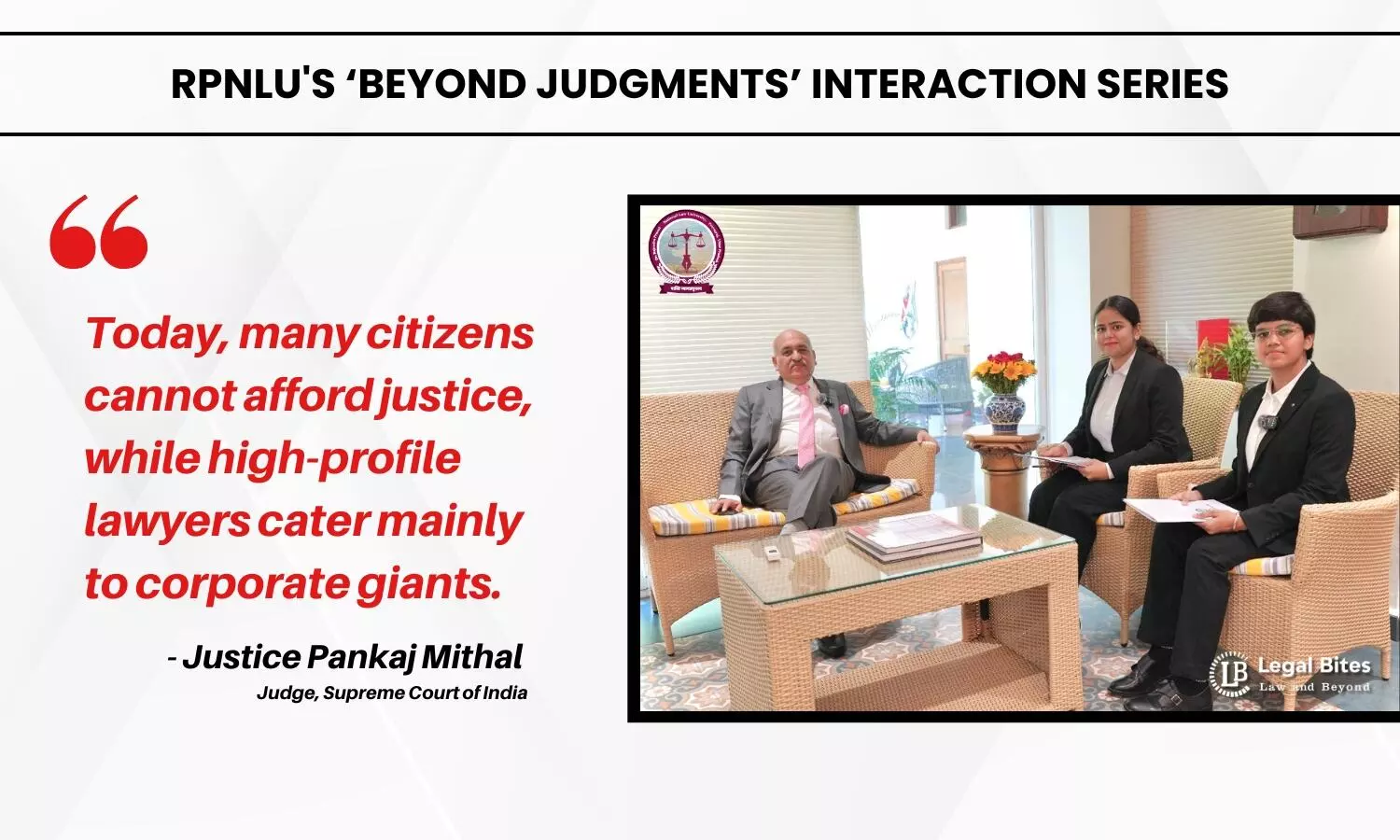Justice Pankaj Mithal Inspires Future Lawyers at RPNLU's ‘Beyond Judgments’ Interaction Series
Justice Pankaj Mithal’s powerful call to Indianise the judiciary left students inspired to view law as a calling rooted in service. Scroll down to read more!

Prayagraj, 20th July 2025 – “It’s not just about Indianising the figure of Lady Justice, but about Indianising the Indian Judiciary itself.” These powerful words by Hon’ble Mr. Justice Pankaj Mithal, Judge of the Supreme Court of India, captured the spirit of the third episode of Beyond Judgments, a distinguished interaction series hosted by Dr. Rajendra Prasad National Law University (RPNLU), Prayagraj.
Hon'ble Mr. Justice Pankaj Mithal Graces the Third Episode of ‘Beyond Judgments’
The episode was held under the visionary leadership of Hon’ble Vice-Chancellor Sr. Prof. (Dr.) Usha Tandon. As part of RPNLU’s flagship initiative Beyond Judgments, the series offers students an exceptional opportunity to engage with the lived experiences of India’s most respected jurists, drawing lessons on law, ethics, and the human side of justice.
A Legacy of Law: Shaped by Family and Curiosity
Hon'ble Mr. Justice Pankaj Mithal, who hails from a family of lawyers and judges—including his father Hon’ble Mr. Justice N. N. Mithal—spoke candidly about how this legacy shaped his early perception of law. He fondly recalled his younger days as an advocate, where he nurtured a passion for writing legal articles. This habit, he said, sharpened his analytical skills and intellectual curiosity, both of which became foundational to his distinguished legal journey.
From Allahabad to Rajasthan: A Judge’s Diverse Journey
Recounting his judicial odyssey, Justice Mithal shared insights from his tenure as a Judge at the Allahabad High Court, and as Chief Justice of the High Courts of Jammu & Kashmir and Ladakh, and later Rajasthan. These postings gave him an in-depth understanding of India's vast legal and cultural landscape. “Justice must reflect the people it serves,” he emphasized, advocating for a judiciary that remains responsive to regional and social contexts.
Making Law Accessible: Call for Standardized Lawyer Fees
In a thought-provoking segment, Justice Mithal suggested the need to regulate lawyers’ maximum fees for the sake of accessibility. Drawing a parallel with consumer goods, he proposed a maximum retail price (MRP)-like system for legal services, stating, “The purpose of law is service, not commerce.” He expressed concern that many ordinary citizens are unable to afford justice, as legal services increasingly cater to elite clients. His remarks sparked a meaningful reflection among students about balancing service with professional livelihood.
Judicial Delays: Beyond the Judges
Addressing the contentious issue of pendency and judicial delays, Justice Mithal dispelled common misconceptions. “Judges are committed and sincere,” he asserted, attributing delays more to systemic inefficiencies—such as procedural hurdles and repeated adjournments—than to the judiciary itself. He cautioned against demanding hasty verdicts, noting that “quick justice may not always be fair justice.”
Gender Sensitisation: Reforms Must Be Inclusive
On the topic of gender sensitisation, Justice Mithal argued for a holistic educational reform, not limited to women’s empowerment alone. “Boys and men must also be educated to respect women,” he said, advocating for a societal transformation rooted in mutual understanding and shared responsibility.
Future Is Hybrid: Embracing Tech, Not Replacing the Courtroom
Commenting on the future of judicial infrastructure, Justice Mithal endorsed a hybrid model that combines digital technology with traditional court proceedings. While acknowledging the advantages of virtual hearings, especially post-pandemic, he emphasized that human connection and in-person advocacy remain irreplaceable. “Technology must assist, not replace, the courtroom proceedings,” he noted.
Legal Education with a Purpose: Beyond Technical Training
Justice Mithal urged legal institutions to focus not only on producing skilled professionals but also on moulding responsible citizens. “We must produce students with moral values who can serve as nation-builders,” he said, stressing the importance of integrity, public spirit, and ethical responsibility in legal education.
Reading, Empathy, and the Human Side of Judging
In a touching personal reflection, Justice Mithal revealed how literature—particularly Hindi literature—continues to inform his worldview and sense of justice. During his conversation with student interviewers Ms. Janhavi Singh, Ms. Srijal Mishra, and Mr. Sujal Sonker (photographer), he said, “Judges are human beings first. What we read, what we believe—it all shapes how we see justice.”
Indianising the Judiciary: A Deeper Cultural Alignment
Perhaps the most powerful message of the evening was his call to Indianise the judiciary—not just in appearance, but in essence. “It’s not just about Indianising the figure of Lady Justice,” he reiterated. “It’s about Indianising the Indian Judiciary itself—ensuring it is rooted in the needs and traditions of our people.”
A Resonating Message for Future Legal Minds
Justice Mithal’s words served not just as guidance but as an invitation to view the law not merely as a profession, but as a noble calling. His insights left a lasting impression on the students of RPNLU, Prayagraj, reinforcing the university’s commitment to experiential, value-based legal education.
With initiatives like Beyond Judgments, Dr. Rajendra Prasad National Law University continues to bridge the gap between black-letter law and the human dimensions of justice, preparing the next generation of lawyers to serve society with empathy, ethics, and excellence.

